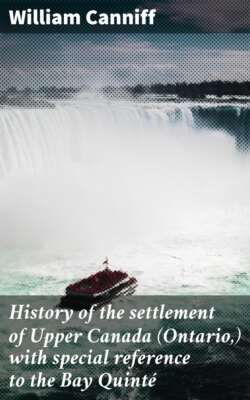Читать книгу History of the settlement of Upper Canada (Ontario,) with special reference to the Bay Quinté - William Canniff - Страница 34
На сайте Литреса книга снята с продажи.
SIR JOHN JOHNSON.
ОглавлениеAmong the officers who served with General Burgoyne was Sir John Johnson, who had been the first to suffer persecution, the first to become a refugee, and who became a principal pioneer in Upper Canada.
“His father, Sir William Johnson, was a native of Ireland, of whom it was said, in 1755, that he had long resided upon the Mohawk river, in the western part of New York, where he had acquired a considerable estate, and was universally beloved, not only by the inhabitants but also by the neighboring Indians, whose language he had learned and whose affections he had gained, by his humanity and affability. This led to his appointment as agent for Indian affairs, on the part of Great Britain, and he was said to be ‘the soul of all their transactions with the savages.’ ”
Of Sir William’s talents and shrewdness in dealing with the likewise shrewd Indian, the following is found in Sabine: “Allen relates that on his receiving from England some finely-laced clothes, the Mohawk chief became possessed with the desire of equalling the baronet in the splendor of his apparel, and, with a demure face, pretended to have dreamed that Sir William had presented him with a suit of the decorated garments. As the solemn hint could not be mistaken or avoided, the Indian monarch was gratified, and went away, highly pleased with the success of his device. But alas for Hendrick’s shortsighted sagacity! In a few days Sir William, in turn, had a dream, to the effect that the chief had given him several thousand acres of land. ‘The land is yours,’ said Hendrick, ‘but now, Sir William, I never dream with you again, you dream too hard for me.’ ”
At the breaking out of the revolutionary war, Sir John, who had succeeded to his father’s title, appears, also, to have inherited his influence with the Indians, and to have exerted that influence to the utmost in favor of the Royal cause. By this means he rendered himself particularly obnoxious to the continentals, as the Americans were then called. Accordingly, in 1776, Colonel Dayton, with part of his regiment, was sent to arrest him, and thus put it out of his power to do further mischief. Receiving timely notice of this from his tory friends at Albany, he hastily assembled a large number of his tenants and others, and made preparations for a retreat, which he successfully accomplished.
“Avoiding the route by Lake Champlain, from fear of falling into the hands of the enemy, who were supposed to be assembled in that direction, he struck deep into the woods, by way of the head waters of the Hudson, and descended the Raquette river, to its confluence with the St. Lawrence, and thence crossed over to Canada. Their provision failed soon after they had left their homes. Weary and foot-sore, numbers of them sank by the way, and had to be left behind, but were shortly afterwards relieved by a party of Indians, who were sent from Caughnawaga in search of them. After nineteen days of hardship, which have had few parallels in our history, they reached Montreal. So hasty was their flight, that the family papers were buried in the garden, and nothing taken with them but such articles as were of prime necessity.” Soon after his arrival at Montreal he was “commissioned a colonel, and raised two battalions of loyalists, who bore the designation of the Royal Greens. From the time of organizing this corps, he became one of the most active, and one of the bitterest foes that the whigs encountered during the contest. So true is it, as was said by the wise man of Israel, that ‘a brother offended is harder to be won than a strong city, and their contentions are like the bars of a castle.’ Sir John was in several regular and fairly conducted battles. He invested Fort Stanwix in 1777, and defeated the brave General Herkimer; and in 1780 was defeated himself by General Van Rensselaer, at Fox’s Mills.”
The result of his adherence to the Crown was, that his extensive family estates upon the Mohawk were confiscated; but at the close of the war he received large grants of land in various parts of Canada, beside a considerable sum of money. He continued to be Superintendent of Indian affairs, and resided in Montreal until his death, in 1822.
